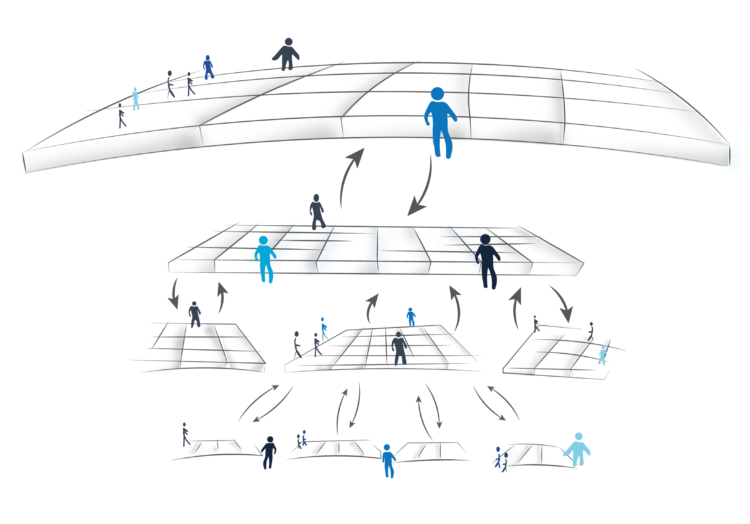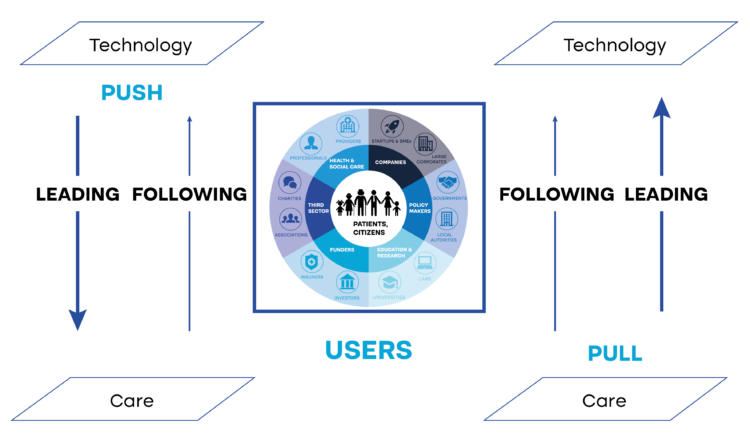About Health Journeys Lab
Shaping the Future of Healthcare Through Co-Creation and Human-Centered Design
The Delft Design Lab Health Journeys focuses on facilitating process thinking and working in healthcare, where opportunities for digitization and innovation can be leveraged in connection with daily patient care. The unique co-directorship from healthcare (Dr. Petra Kok, Rheumatologist and CMIO at Reinier de Graaf Gasthuis) and technology (Dr. ir. Armagan Albayrak, Assistant Professor) drives the lab’s research.
The objectives of our design lab:
- Utilizing health technologies at the right time and place within health journeys.
- Integrating process solutions around the patient to enhance human interactions and healthcare management.
- Promoting the adoption and implementation of process thinking across the healthcare ecosystem, connecting different perspectives and users within and across organizations.

Technology that aligns with patient care workflows enhances job satisfaction for healthcare workers and fosters sustainable healthcare transformation. Co-creating technical solutions that support human capabilities leads to greater focus on patient care.
Human-Centered Design in Healthcare
The foundation of ‘Human-Centered Design’ is the integration of the human perspective with new technologies and organizational structures, with the user at the heart of the design process. Designers excel at connecting people around processes. Co-design considers users’ wishes, challenges, and needs, ultimately arriving at solutions that support and facilitate them. The design method of journey mapping strengthens connections with users in the healthcare ecosystem. By visualizing the journey, we create a shared vision and language for change. This visual design fosters connection and empathy, encouraging collaboration. A clear route helps navigate and drive necessary changes in healthcare, with a shared goal and collective responsibility.
Human-Centered Design serves as the methodology and scientific foundation for integrating technological and stakeholder perspectives across the healthcare ecosystem. This approach generates solutions that enhance collaboration by leveraging everyone’s expertise and talents to support users in daily patient care. These initiatives create opportunities to design and visualize processes digitally, enabling analysis, optimization, and automation.
Mixed methods are used to validate and iteratively refine process design concepts. This includes both qualitative interviews and focus groups, as well as quantitative data analysis with stakeholders such as patients, healthcare professionals, health management, policymakers, and health technology experts. This ensures a comprehensive understanding and addresses both theoretical and practical perspectives.
At the Health Journey Lab, we empower students and researchers to design healthcare solutions through their talent and creativity in co-creation. The Lab blends diverse perspectives—clinical, academic, economic, patient-centered, and technological—creating a rich mix of expertise. Armed with knowledge in human-centered design, digital health, and value-based healthcare, the team employs advanced methodologies to drive research and innovation.
Designers, along with stakeholders within the healthcare ecosystem, collaborate creatively and scientifically to shape the future of healthcare sustainably.
Daily patient care drives healthcare innovation—by healthcare, for healthcare.
Healthcare Ecosystem
The healthcare ecosystem consists of different layers, organizations, stakeholders, and health technologies, all interacting together.

Micro- level
At the caregiver-patient interaction level, this research and design process leads to better workflow support through appropriate technologies that assist in daily healthcare, enabling caregivers to focus more on patients with increased attention and job satisfaction. At the same time, patients become empowered and play an integral role in their own health journey.
Meso- level
At the organizational level, process design can guide and direct healthcare transformation, improving capacity utilization and creating opportunities for quality improvement based on daily practice workflows. The integration of management information helps address the increasing demand for care and shortages within the healthcare ecosystem.
Macro -level
At the policy level, goals are set for healthcare transformation. However, there is often a disconnect between policy and the operational and organizational levels, making it difficult to shape, implement, and scale healthcare transformation. Insights from healthcare processes provide input for solving policy challenges. Our research marks an initial step toward developing an infrastructure—a system design that visualizes and connects healthcare policy’s digitization goals with other levels in the system. This infrastructure serves as an early guide to collectively steer the objectives of healthcare digitization, linking healthcare with policy and policy with healthcare. In this way, digitization opportunities are optimized, creating a ‘closed loop’ between healthcare providers, organizations, and policymakers.
Health technology

Currently, most innovations follow a technology-push approach. However, sustainable transformation can only be achieved by creating a feedback loop between the care process (care-pull) and health technology (tech-push). Co-creation with health technology partners, developed in alignment with healthcare processes and users within the healthcare ecosystem, results in technical innovations that enhance caregiver-patient interactions in daily practice. Innovating in harmony with the care process leads to co-creation from the core of healthcare.
Improving healthcare experience
Stakeholder benefits
Engaging patients, healthcare professionals, healthcare management, policymakers, and health technology partners ensures that stakeholder insights guide solutions that benefit everyone involved in the healthcare ecosystem. Digital process mapping makes it easy to design and visualize care processes, providing clarity both in daily healthcare practice and at the organizational level. On a national platform, care processes can be shared, enabling mutual learning. By consolidating these processes, we can create blueprints for hybrid care guidelines. Additionally, policymakers and external companies can use these care processes as a guide when developing their procedures and services.
Value-Based Healthcare
Linking digital process design with Activity-Based Costing and Value-Based Healthcare principles offers the opportunity to create financially sustainable, patient-centered care pathways. Activity-Based Costing provides detailed insights into the costs associated with each healthcare activity, enabling the evaluation of financial effectiveness and potential cost reductions. This approach is complemented by value-based outcome measurement and patient-centered care pathways, ensuring that the digital processes lead to meaningful improvements in patient experience and healthcare delivery.
Patient participation and empowerment
Partnering with patients ensures that their perspectives are central to care process design. Patients are actively engaged through various methods such as focus groups and interviews. Their insights are integrated into the design and validation of hybrid care pathways, ensuring that healthcare transformation aligns with patient needs, experiences, and emotional well-being, thereby enhancing relevance and effectiveness. This dynamic feedback empowers patients and promotes holistic, evidence-based care that addresses both clinical and emotional needs.
Shared-decision making
A core aspect of patient participation is shared decision-making. Providing an overview of the patient journey encourages collaboration between patients and healthcare providers, supporting shared decision-making throughout the care process.
This approach ensures that healthcare transformation is truly patient-centered, inclusive, and equitable
Design is no longer just a process of creating physical products; it has evolved into a process that fosters transformation and enhances the quality of healthcare
By focusing on systematic process design rather than specific tools, design improves how healthcare services are delivered. This methodology contributes to a deeper understanding of process efficiencies and advocates for proactive improvements in care delivery across the patient journey. The healthcare process becomes central to the healthcare ecosystem, making innovation a visible, iterative process where steps are taken collaboratively, energizing and uniting efforts.
Various strategies—such as streamlining workflows, leveraging technology, reducing administrative burdens, and enhancing communication—can be implemented through process design to improve accessibility, empower patients, enhance the quality of care, and boost efficiency. Digitalization and process optimization are essential for transforming healthcare to provide appropriate care while enhancing patient outcomes, efficiency, job satisfaction, and quality. We aim to achieve comprehensive process automation that considers outcomes and costs
throughout the entire patient journey, building a resilient and adaptive health ecosystem for the future